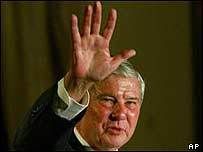This is what you get when both the interviewer and subject play it safe, and say absolutely nothing substantive.
Michael Tomasky writes:
I have interviewed Hillary Clinton a handful of times since our initial meeting in 2000, during her first Senate race, when I must have seen her give 50 - 100 speeches en route to her thrashing of Republican opponent Rick Lazio.
She is a much more fluid politician today than she was in the fall of 1999, certainly. But she is still not known as an especially expansive interview subject. She has a reputation for avoiding actually answering the question, and reverting to a pre-ordained script, to a degree even greater than your average politician.
These qualities were on display at times in our chat. When I asked, for example, about the Democratic Congress' failure to cut off funding for the war, she went into a critique of Republican legislators' unwillingness to break with President Bush and said "the political reality is we don't have the votes".
The trick, then, I thought, would be to ask some germane but slightly offbeat questions in the hope that she hasn't already been asked them a thousand times and might say something new. I began with three such questions on foreign policy-related issues, and overall, her answers gave a somewhat new picture of Clinton in that in each case, the candidate who has spent years cultivating a relatively hawkish foreign policy image notably did not give the most hawkish answer she might have.
On executive power, I pointed out that if elected she would be entering the White House with far more power than her husband had as a result of moves by Bush and Dick Cheney to invest a degree of unilateral power in the executive branch that some find dangerous. "Well, I think it is clear that the power grab undertaken by the Bush-Cheney administration has gone much further than any other president and has been sustained for longer," Clinton said. "Other presidents like Lincoln have had to take on extraordinary powers but would later go to the Congress for either ratification or rejection."
She continued: "There were a lot of actions which they took that were clearly beyond any power the Congress would have granted or that in my view that was inherent in the constitution. There were other actions they've taken which could have obtained congressional authorisation but they deliberately chose not to pursue it as a matter of principle."
Here I asked whether a sitting president, once invested with such powers, could really give some of them up in the name of constitutional principle. Clinton said: "Oh, absolutely, Michael. I mean that has to be part of the review that I undertake when I get to the White House, and I intend to do that."
Moving to Iraq, I asked whether she felt that war fit within the tradition of cold war liberalism that we associate with Harry Truman and his secretary of state, Dean Acheson. This question has been intensely debated among liberal war supporters and opponents since 2003, and how one answers it-especially if one is a Democrat-gives some indication of how one views the morality of pre-emptive or preventive war, and thus, of how one might make future foreign policy decisions. Many liberal war supporters have argued that the fight against terrorism is analogous to the cold war battle with the Soviet Union.
Clinton seemed to reject this. "It's hard to take what was a philosophy with respect to the use and containment of power during the cold war and try to shoehorn it into a post-cold war context," she said. "So I don't really think there is an easy or satisfying answer to that."
Most interesting was Clinton's answer to my question about whether terrorists hate us for our freedoms, or whether they have specific geopolitical objectives. Bush and other administration officials have said repeatedly that terrorists hate us for our freedoms. The implication of this premise, of course, is a fight to the death that is never over until the president says it's over (which in turn requires that we trust the president with enormous unilateral powers). It was one of those premises on which, in the days right after September 11, we were all supposed to agree.
Clinton clearly takes a different view: "Well, I believe that terrorism is a tool that has been utilised throughout history to achieve certain objectives. Some have been ideological, others territorial...And I think we've got to do a much better job of clarifying what are the motivations, the raisons d'etre of terrorists."
She added, "I think one of our mistakes has been painting with such a broad brush, which has not been particularly helpful in understanding what it is we were up against when it comes to those who pursue terrorism for whichever ends they're seeking."
So it's not, I asked, helpful to America's fight to say they hate us for our freedoms? "Well, some do," Clinton said. "But is that a diagnosis? I don't think it's proven to be an effective one."
Clinton has run, it is almost unanimously agreed, a brilliant campaign to this point. Having closely watched her slowly and methodically woo New Yorkers over a 16-month period in 1999 and 2000, allaying their concerns and getting them to submit finally to her undeniable competence and intelligence, I can say that I see much the same kind of process unfolding in its early stages this year. The lead she has steadily built up in the national polls among Democrats, however relevant to the selection process they may or may not be, is testament to this.
Still, of course, many questions remain about both her electability and how she would govern if elected. I'd love to have been able to go through all of these matters in detail, but time was running short, so I just chose to focus on one thing, having to do with how she would govern.
One major concern of liberals about Clinton is her preternatural caution as a politician-her general unwillingness to stick her neck out and risk political capital in behalf of a progressive policy goal that wasn't a safe issue. I asked her to name one issue during her Senate tenure on which she'd done this. Answer: "Well, I think, you know, voting against funding. What did we get, 12, 13, 14 votes on that?" She was referring to a vote last May to make emergency supplemental appropriations to the Iraq war effort. The measure passed 80-14. Clinton and her chief rival for the Democratic nomination, Barack Obama, both voted no, announcing their votes very late in the process.
This, of course, wasn't really what I meant. By the time of this vote, she was in full presidential campaign mode and trying to establish her bona fides with the party's anti-war base. So the political risk inherent in this vote was small. Indeed it was Joe Biden, who was the only senator/presidential candidate to vote yea, who risked something politically, whatever one thinks of his vote substantively.
After I followed up, Clinton went into a defence of how progressive her voting record was; but again, this wasn't what I meant. I was asking about examples of leadership. So the answer to the question was that there really wasn't one thing that she could think of on which she'd taken a risk in behalf of a progressive policy end.
For many Democratic voters, this is the heart of the continuing Clinton conundrum. She is running on a reasonably progressive platform, especially with regard to health care, and even on issues like labour and trade, where she has staked out positions somewhat to her husband's left. Some of her answers to me on foreign policy suggest that she could depart more strongly from the neoconservative agenda than some sceptics might assume ("one of the lessons that I think we all should take out of the last six-and-a-half years is that ideologically driven foreign policy that is not rooted in a realistic assessment of the world as we find it today is not likely to result in any positive outcome").
But at the end of the day there remains the question of how aggressively she would pursue some of her more laudable goals as president. Passing universal health care and bringing the war in Iraq toward its conclusion will both need to be done early in her tenure. Both will require enormous risks of political capital and courageous leadership, especially considering how intensely her political opponents are likely to fight her. As a senator, aware that she is a lightning rod for the right wing, she has tended to work behind the scenes, letting colleagues take the lead.
That's worked well for her. But the difference between the Senate and the White House is that a president has no colleagues. "Change is just a word," she told me, "if you don't have the strength and experience to make it happen." She meant the sentence as a knock on Barack Obama, but they will be words for President Hillary Clinton to live by as well.



